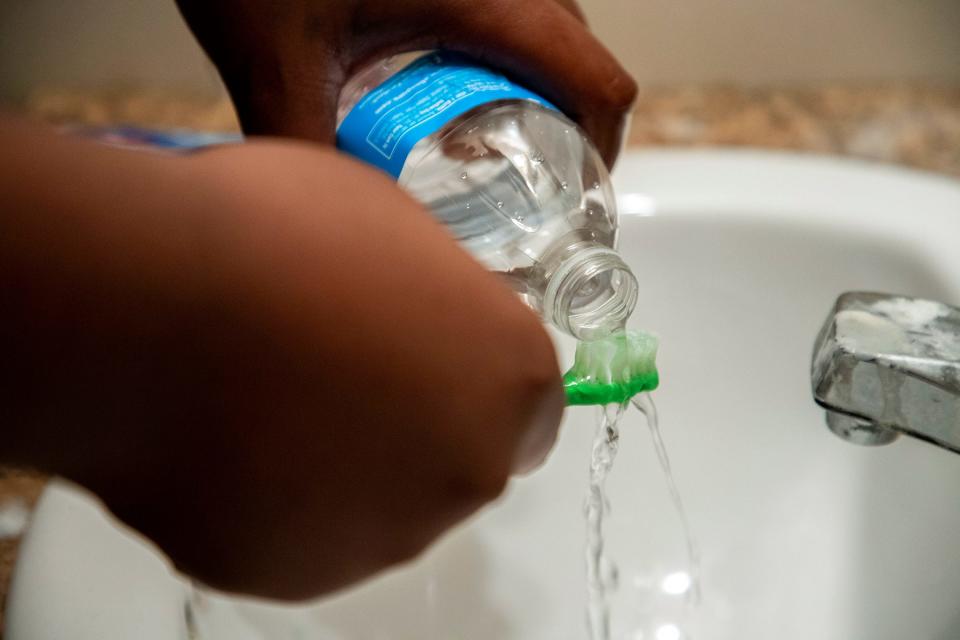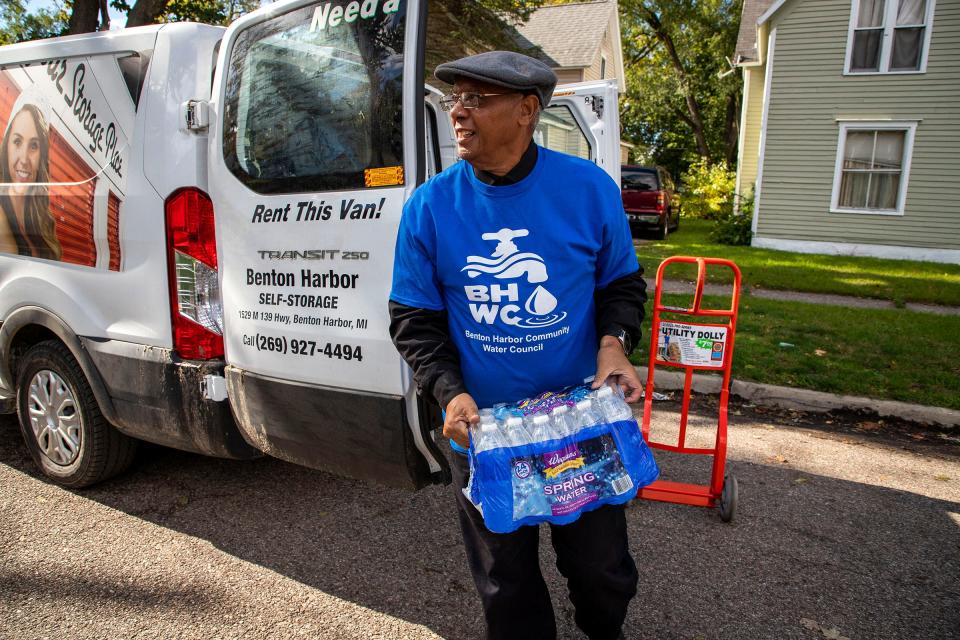A year after raised alarms, almost all lead pipes replaced in Benton Harbor
- Oops!Something went wrong.Please try again later.
Almost all Benton Harbor residents' lead water lines have now been replaced, a major milestone in the effort to stem the community's chronic problems with elevated lead in its public water supply.
Gov. Gretchen Whitmer on Wednesday announced that 99% of the city's water service lines have been inspected and replaced with new copper lines if lead or galvanized pipe was found. Nearly 4,500 water service lines have been replaced or verified as nonlead, and only 40 inspections remain in the community of 9,800 residents, 85% of whom are Black.
The announcement comes just over a year after more than 20 environmental groups and community leaders filed an emergency petition with the U.S. Environmental Protection Agency, seeking federal intervention into a lead-in-water crisis in Benton Harbor that they saw as languishing under state control.
More: Neglect, mismanagement, dangerous mistakes doomed Benton Harbor's water
More: Judge dismisses Flint water crisis cases against ex-officials after Supreme Court ruling

'We are not willing to wait any longer'
Prior to the September 2021 emergency petition, Benton Harbor's lead levels had exceeded federal safe drinking water standards for three straight years.
"For at least three years, the people of Benton Harbor have been waiting for safe drinking water uncontaminated by dangerous lead. But we are not willing to wait any longer," the Rev. Edward Pinkney, president of the Benton Harbor Community Water Council, said at the time. "It's urgent that the EPA intervene to give this community access to water that won't harm our health, especially our children's health."
With the stinging legacy of the Flint water crisis still fresh in Michigan's consciousness, the public outcry in Benton Harbor spurred a major response by the state. Whitmer proposed an all-hands-on-deck approach with all levels of government and private partners to address the problem. Benton Harbor residents, since the fall of 2021, have received distributed bottled water. A redoubled effort was made to ensure residents had appropriate filtration systems on their taps. And the state vowed to replace all of the city's lead service lines by March 2023.
"Every Michigander deserves access to safe drinking water and (to) have confidence in the water coming out of their tap," Whitmer said in a statement Wednesday.

How lead creates health and developmental problems
Michigan Department of Health and Human Services Director Elizabeth Hertel urged Benton Harbor families to continue to use filters or bottled water for cooking, drinking, brushing teeth, rinsing foods and mixing powdered infant formula, until they have received a free home lead inspection from the agency "to ensure there are not additional sources of lead in their homes from paint or plumbing."
For more information on the free home lead inspection and abatement, go to michigan.gov/mileadsafe.
According to the federal Centers for Disease Control and Prevention, no safe level of lead in children has been identified. Adverse effects from excessive exposure to the heavy metal include:
Damage to the brain and nervous system.
Slowed growth and development.
Learning and behavior problems.
Hearing and speech problems.
High lead exposure also has been tied to lower IQ, decreased ability to pay attention and underperformance in school.
The new copper water service lines, along with ongoing technical support to the city's drinking water plant, will improve the long-term reliability and safety of Benton Harbor's drinking water infrastructure, and help in "rebuilding people's trust and confidence in their water," said Liesl Clark, director of the Michigan Department of Environment, Great Lakes and Energy.
Pinkney, one of the first to sound the alarm in the fall of 2021, praised the vocal, urgent call to public action that compelled all levels of government to respond.
"Replacing Benton Harbor's thousands of lead water pipes in just one year, well ahead of schedule, was unthinkable last fall," he said. "I hope the persistence of Benton Harbor residents will inspire other communities fighting to make their tap water safe."
Communities throughout Michigan may have lead service lines in place from generations ago — and in many cases, the community isn't sure. Nine Michigan cities or townships reported elevated levels of lead in their drinking water, at or exceeding the 15 parts per billion federal action limit, in 2021.
"Even as we celebrate this milestone in Benton Harbor, we can't forget that the scourge of lead service lines remains in many communities in Michigan — including in Flint, where there are more than 1,000 homes whose pipes haven't been checked for lead and replaced if needed," said Cyndi Roper, a Michigan senior policy advocate with the nonprofit Natural Resources Defense Council's Safe Water Initiative. The environmental group was one of the co-filers of the emergency petition with EPA regarding Benton Harbor water in the fall of 2021.
In March, Whitmer and the GOP-led Legislature agreed on a $4.7 billion plan that included more than $1.7 billion specifically for replacing lead pipes, reducing contamination by dangerous PFAS chemicals and creating "healthy hydration" locations in schools and child care facilities. The legislative package included $45 million for Benton Harbor to help the city speed up the pipe replacement process.
Free Press staff writer Dave Boucher contributed to this report.
Contact Keith Matheny: kmatheny@freepress.com.
This article originally appeared on Detroit Free Press: A year after call to action, Benton Harbor's lead water pipes replaced

